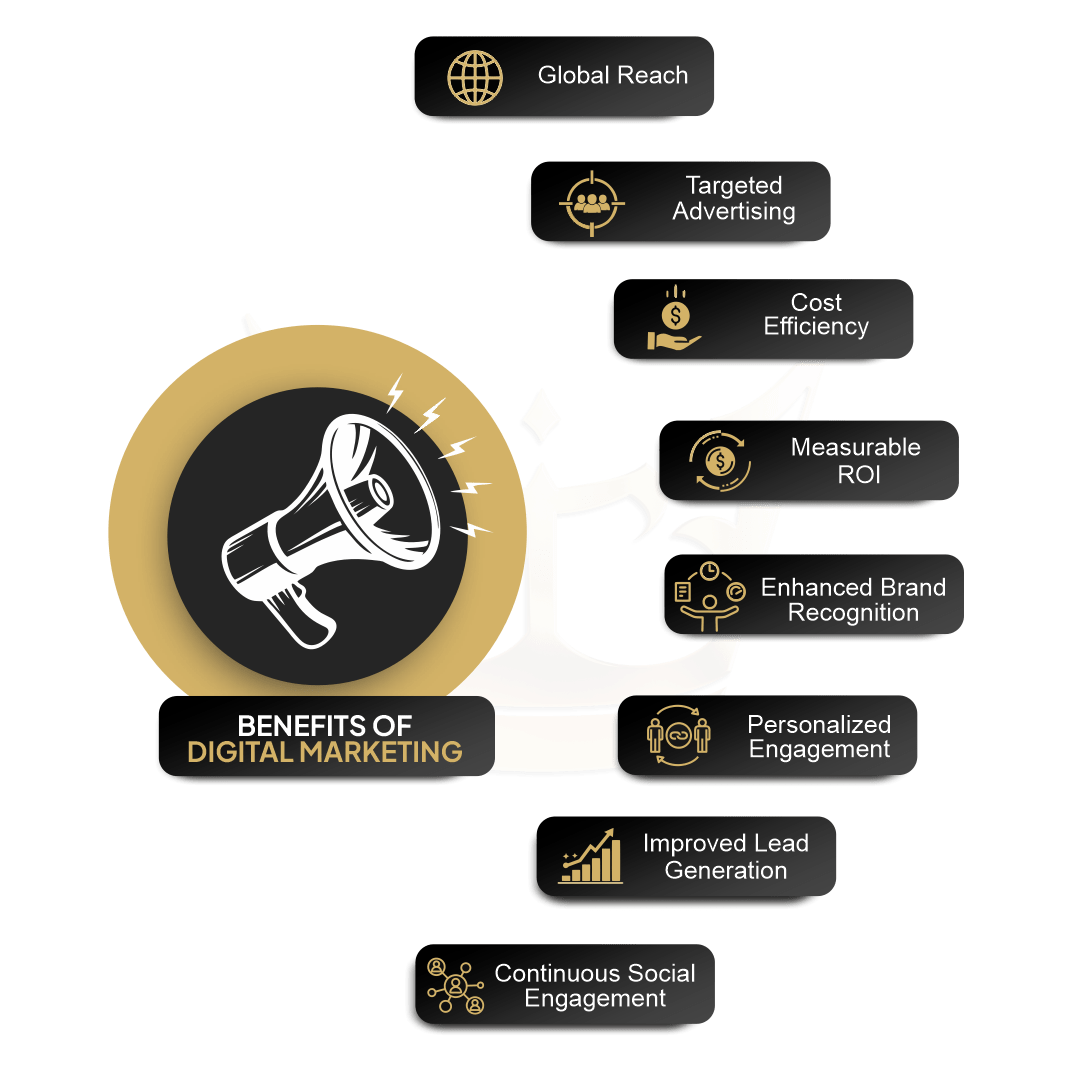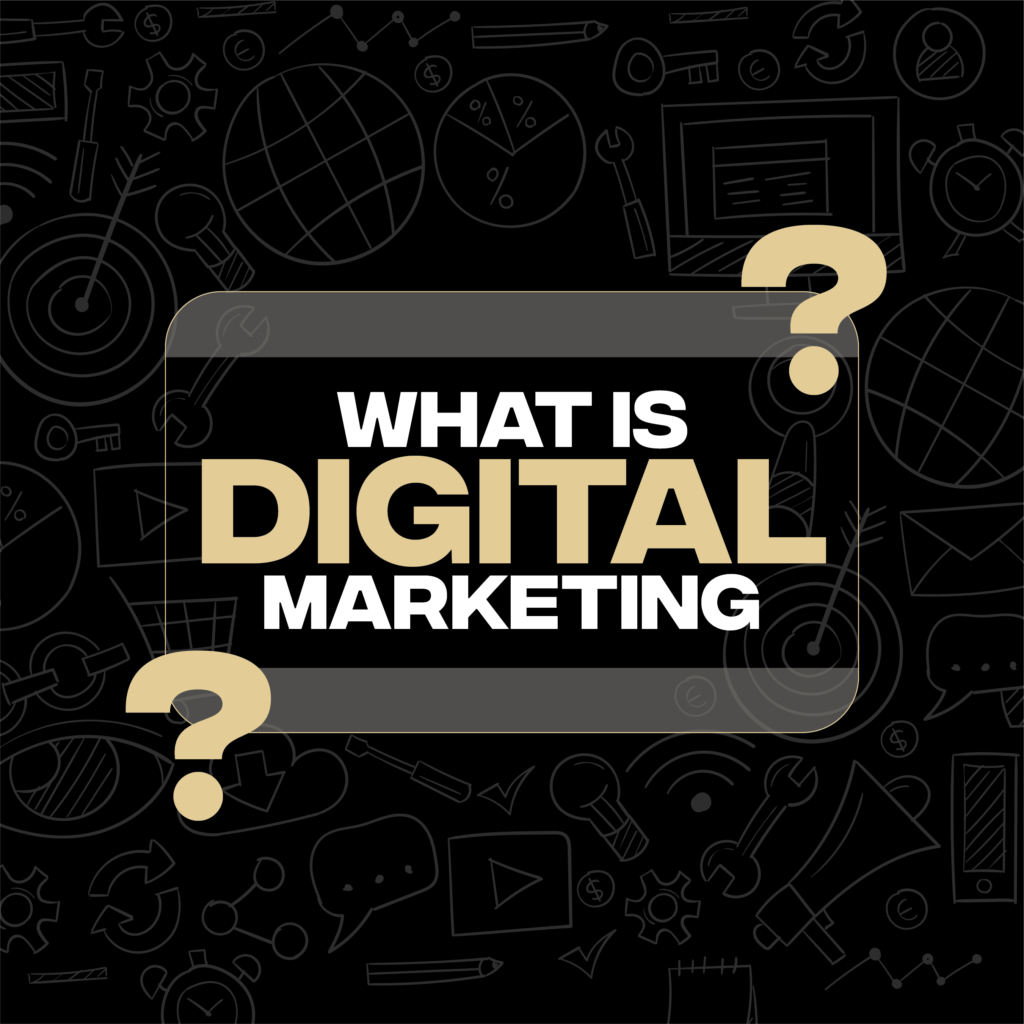Introduction to Digital Marketing
In today’s digital world, businesses use digital marketing to reach their users through websites, social media, ads, email/marketing, and content marketing. Digital marketing refers to all marketing efforts that use the Internet and digital technologies to connect with customers.
Table of Contents
Toggle
What is Digital Marketing?
Digital marketing is the best way to promote your services, products, and businesses online. It involves promoting services and products using digital channels like websites, social media, SEO, content marketing, and email marketing. Online Marketing allows you to target your audience and reach out to your users more quickly.
Why is Digital Marketing Important?
Digital marketing is important in today’s business because it helps companies reach their exact target audience, connect more with that audience, and is more cost-effective than traditional marketing. Digital marketing offers real-time information, personalized campaigns, and global reach.

- Wider Audience Reach – Additionally, online marketing allows businesses to target specific groups of people, making sure their message reaches the right audience. This creates opportunities for businesses to grow and succeed in new markets.
- Cost-Effective Marketing – Traditional marketing, such as TV and print ads, can be expensive. Digital Marketing allows businesses to run cost-effective campaigns using PPC advertising, social media marketing, email marketing, and SEO.
- Targeted Advertising – In digital marketing, we look at the audience in the right way, target them based on their interest, behavior, and release that business to those people in the market who really want to find your services, products, and business.
- Real-Time Performance Tracking – Unlike traditional marketing, digital marketing provides instant analytics. Businesses can track engagement, clicks, conversions, and other key metrics to optimize their strategies for better results.
- Improved Customer Engagement – Social media, email, or chatbots allow businesses to chat directly with users and provide solutions to their problems, thereby increasing user trust.
Key Components of Digital Marketing
Digital marketing consists of several key components that work together to build an effective online presence, leveraging various strategies to engage and convert potential customers.

- Search Engine Optimization (SEO) – Through this, we can rank our website on Google, Yahoo, Bing, and more, while generating organic leads from the website.
- Content Marketing – Content Marketing – In this strategy, we create engaging content for social media, websites, blogs, email campaigns, and more to attract the right audience.
- Social Media Marketing – With the help of social media platforms, we can connect with users on Facebook, Instagram, LinkedIn, and more. This helps increase visibility, engage with customers, and share offers, special discounts, and new launches to keep them informed about your shop.
- Pay-Per-Click (PPC) Advertising – In this strategy, we run paid ads using platforms like Meta and Google Ads to reach our target audience. Depending on our goals, we can run awareness campaigns, lead generation campaigns, engagement campaigns, and more.
- Email Marketing – In this strategy, we send targeted emails to our subscribers to keep them updated, promote offers, share news, and drive engagement. This helps increase conversions and build customer loyalty.
- Affiliate Marketing – Affiliate marketing is a performance-based strategy where affiliates earn a commission for driving traffic or sales to a business through their unique referral link.
- Video Marketing – Video Marketing – video marketing is one of the best way to engage with audience, we create engaging videos to promote our brand, products, or services. These videos can be shared on platforms like YouTube, social media, and websites to increase brand awareness, drive traffic, and engage with our audience.
- Marketing Analytics and Data Analysis – We collect and analyze data from various marketing campaigns to measure performance, understand customer behavior, and make data-driven decisions.
- Mobile Marketing – Mobile Marketing is a digital marketing strategy that targets users through mobile apps, SMS, and mobile-friendly websites to engage and convert consumers.
Benefits of Digital Marketing
In digital marketing, we reach our target audience, it is cost effective, it builds brand awareness, it also builds trust, and it offers businesses flexibility to adapt and grow efficiently.

- Increased Brand Awareness – By online advertising, we reach a larger audience, which increases our brand awareness and also builds trust
- Better Customer Targeting – You can target the right users of your services and products and reach those who need your services and products
- Higher Conversion Rates –By optimizing marketing strategies and targeting the right audience, businesses can improve user engagement and drive higher conversion rates, turning visitors into loyal customers.
- Data-Driven Decisions – By analyzing key metrics and customer insights, businesses can make informed decisions that enhance marketing strategies, optimize performance, and drive better results.
How to start Digital Marketing
Starting in digital marketing requires a clear strategy. Begin by defining your target audience, choosing the right platforms, and creating engaging content. Leverage SEO, social media, and email marketing to build visibility. Track performance and optimize for continuous growth.

- Define your goals – You need to decide in advance what you want to achieve (brand awareness, lead generation, or sales).
- Identify your target audience – You can research demographics, interests, and behavior with your customers. You can use tools like Google Analytics and social media insights for data.
- Create a website – Create a professional, mobile-friendly website with SEO optimization. One that your users can clearly see and understand what your business, services, or products are about.
- Take advantage of SEO – The website needs to be optimized, contain relevant keywords, pay attention to on-page, off-page and, technical SEO, and create a good strategy.
- Use social media marketing – Choose the platforms where your audience is most active (Facebook, Instagram, LinkedIn, etc.).
- Start content marketing – You need to create content such as blogs, videos, infographics, and emails to engage and educate your audience
- Invest in paid advertising – If you want quick results and to reach your audience, then you can run paid ads like Google Ads and Meta Ads.
- Implement email marketing – You can run promotion, offers through email marketing
- Analyze and improve – Improve your business performance using analytics tools
- Stay updated and keep learning – Digital marketing is growing day by day so you must always stay updated with the market so that you can move ahead in your business.
Digital Marketing Trends in 2025
Digital marketing in 2025 will be driven by AI, voice search, and hyper-personalization. Brands focus on immersive experiences, influencer collaborations, and data privacy. Short-form videos and interactive content dominate, while automation and chatbots enhance customer engagement for a seamless digital experience.

- AI-Powered Marketing – AI tools personalize user experiences.
- Voice Search Optimization – More users rely on voice assistants.
- Interactive Content – Quizzes, polls, and live videos boost engagement.
- Sustainable Marketing – Eco-conscious brands gain popularity.
- Short-Form Video Content – Platforms like shorts and Reels dominate marketing.
Conclusion
Digital marketing is an essential strategy for businesses in the modern era. Companies can efficiently reach and engage their target audience with various tools and techniques available. By staying updated with trends and continuously optimizing strategies, businesses can drive growth and remain competitive in the ever-evolving digital landscape.


2 Responses